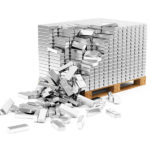Markets nervous as Trump trade rhetoric escalates
(July 11, 2018 - by Lawrie Williams)
Maybe the trade war between the U.S. and China is beginning to escalate and with the potential for further moves to get out of hand, global equity and commodity markets are already getting nervous.
The latest move in the U.S.-China trade war – which is the one which really matters – is the threat by the Trump Administration to implement a 10% general tariff on some $200 billion of a wide range of Chinese imports into the U.S. after a two-month consultation period. This follows on from Washington imposing 25% tariffs on some US$34 billion worth of Chinese imports with Beijing responding immediately with matching tariffs on the same amount of U.S. exports to China. Washington sees the tit for tat response by China as totally unjustified. Reuters reports U.S. Trade Representative Robert Lighthizer as saying "For over a year, the Trump administration has patiently urged China to stop its unfair practices, open its market, and engage in true market competition…. Rather than address our legitimate concerns, China has begun to retaliate against U.S. products ... There is no justification for such action."
But, as with diplomatic expulsions, trade wars tend to generate tit for tat actions of this type and China has said it will retaliate to any new tariff impositions. As we have noted before, China probably has a far more resilient economy than the U.S. with enormous rapid growth in the middle-class element of its society and thus may be able to absorb any resulting downturn of trade with the U.S. as a result of increased tariffs with increased domestic consumption. It is working to this anyway – U.S. tariff impositions may just lead to an acceleration of the process.
On escalation, President Trump has intimated that he is prepared to implement tariffs on more than $500 billion of Chinese goods imported into the USA – roughly the sum total of all Chinese imports into the country. Given that Chinese imports of American goods have a value of far less than this – but nevertheless are substantial – the President may feel he holds the whip hand here, but with the global economy still growing China may be able to replace at least some of any U.S. downturn in imports with new markets, as well as ever rising domestic consumption, and the effects on the Chinese economy may well be rather less than the U.S. Administration reckons. China has other retaliation options too – not least in the running down the dollar-related composition of its forex holdings. Perhaps it will replace some of these with gold – indeed it may already be doing so ‘under the counter’ so to speak.
But what effect will an increase in tariffs on Chinese goods have on the U.S. domestic economy. Raw material tariffs on Chinese and that sourced from other areas, will put up input prices for U.S.- manufactured goods for domestic and overseas markets. If a wide range of Chinese consumer goods are subject to tariffs too – the Reuters report mentions a list of thousands of Chinese imports the Administration wants to hit with the tariffs, including hundreds of food products as well as tobacco, chemicals, coal, steel and aluminum. It also includes consumer goods ranging from car tires, furniture, wood products, handbags and suitcases, to dog and cat food, baseball gloves, carpets, doors, bicycles, skis, golf bags, toilet paper and beauty products! This will all put up prices for the American person in the street, fuel inflation and run counter to the President’s promised intent of improving the financial lot of the U.S. consumer. Tariff wars are a two-edged sword and generally do not do anyone any good.
Of course as Jim Rickards notes in a series of recent articles the overall pattern of such policies tends to be an escalation from a currency war to a trade war and ultimately a shooting war. While we don’t see a direct U.S.-China military confrontation any such shooting war would no-doubt be a proxy affair involving a third-party nation with each super-power on opposing sides – and given the state of global geopolitics there are plenty of possible flash points here.
So, given the prospects of the escalation of the trade war assuming that Presidents Trump and Xi are neither likely to back down from their entrenched position, equities markets are already beginning to look very nervous. The dollar is looking stronger by the day in a somewhat contrary reaction and commodities, including precious metals, are being marked down in dollar terms as a result, but may be rising in many other currencies.
It may not take much for equities to crash – they are looking mostly over-bought anyway stimulated by Fed easing over the past several years. The prospects of an ever-growing trade war, coupled with the Fed’s current tightening programmer, present a growing nightmare for equities and a more generalized market crash – to rival, or exceed, that of 2008 could be imminent. As we have noted before precious metals could be adversely affected too – at least in the initial stages of such a crash as investors and funds struggle for liquidity, but medium to long term they should come into their own as their ‘safe haven’ qualities all come to the fore.
Let’s hope this rather dismal scenario does not come about. But we do seem to be heading in this direction and the Trump Administration’s trade policies are not helpful.






